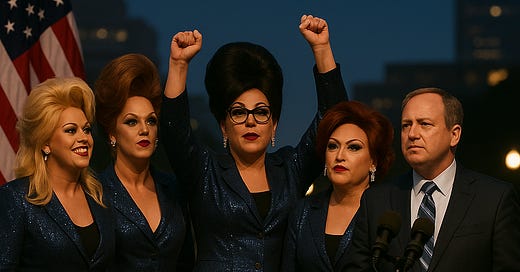Unity in Motion: The Queens’ Plan Ignites a Nation
As the final daylight of Day 7 fades, a bold counteroffensive against Project Garrison begins to form—spearheaded by an unexpected coalition and announced with sequins, steel, and strategy.
Written by Jax Rowe
June 29, 2025
DOMINION CITY — As twilight descended upon the seventh day of PrideFest, the energy at Unity Park morphed from jubilant celebration to focused resolve. The main stage, once home to lip sync battles and comedy acts, became the epicenter of political resistance as five drag queens, accompanied by Representative Joshua Lane Mercer and several members of Congress, publicly unveiled the first phase of their plan to combat Project Garrison.
Project Garrison, leaked earlier this week, outlines a multi-pronged federal effort by President Trask’s administration to stifle LGBTQ+ gatherings through financial chokeholds, permit denials, and AI-powered surveillance. But tonight, in front of tens of thousands, Mercer held firm: “We will not be erased. Not this year. Not next. Not ever.”
The drag queens—Lady Morpheus, Freida Toast, Auntie Venom, Monique Machete, and Glitterbomb Grace—commanded the stage not just with charisma, uniqueness, nerve, and talent, but with comprehensive strategy.
“We’re done being cute for cameras,” said Lady Morpheus, donning a blazer over her corset. “Tonight, we become organizers. Lobbyists. Protectors. Queens of Resistance.”
The proposed counteraction, dubbed “Operation Mirrorball,” includes:
A national digital mutual aid network to protect queer events with legal defense funds and emergency grants.
An encrypted reporting system for grassroots organizers to log intimidation, permit denials, and threats in real time.
A push to pass the Freedom of Assembly Integrity Act—a bipartisan bill Mercer promised to introduce within the month.
An open-call to legal and cybersecurity professionals to volunteer pro bono support to any organization impacted by Project Garrison’s enforcement.
“We will not fight fire with fire. We will fight it with floodlights, spreadsheets, and subpoenas,” said Freida Toast, producing a thick document titled Draft v1.3: Pride Infrastructure Security Manual from her updo.
Even some hesitant moderates in the crowd, initially wary of the queens taking such a serious mantle, seemed moved. “I came for a parade and some glitter,” one man said. “I’m leaving ready to testify in front of Congress.”
While most of the crowd celebrated the unveiling of the plan, skeptics remained. “I love what they’re doing, but we need more than speeches and PDFs,” said activist Eliza Cortez. “We need regional coordination and legal recognition now.”
Still, by the end of the evening, the crowd had reached a fervent consensus: this year’s Pride was no longer just about celebration—it was a call to civic action.
As fireworks lit the skyline, Mercer took the mic once more:
“When the history of this moment is written, let it say that the first blow against authoritarianism didn’t come from a boardroom or war room—but from a dressing room behind a Pride stage.”
Unity thundered from the crowd, as chants of “This is our house!” echoed into the night.





Brains, beauty and determination.